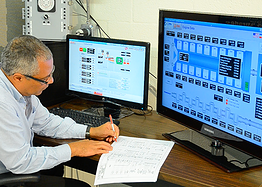Control System Integration
The MSHS Pacific Power Group Engineering Service team specializes in control, monitoring, and protection system modernizations, and programming solutions. Our design and application engineers have decades of experience developing and supporting engineered system solutions for a wide range of industries: marine, offshore, utility/power generation, pulp & paper, chemical processing, refinery, pipeline, and wastewater treatment.
From off-the-shelf products to custom software, MSHS engineers develop and support your project from initial site visit to installation, testing, commissioning, and training.
- Custom control upgrades & system integration
- New product development: innovative designs adapt products to customer-specific applications
- Engine protection & monitoring: synchronizing, paralleling & load sharing, voltage regulation, emission controls & monitors
- Data monitoring & software: HMI, SCADA & DCS, PLC’s from leading manufacturers plus Woodward’s GAP software
- Web-based, remote support
- Safety compliance, emissions, monitoring
- Mechanical & electrical design, CAD drawings
- Project management, installation, commissioning
- Complete turnkey solutions

MSHS Pacific Power Group integrates plant subsystems with distributed control systems (DCS) to maximize productivity and improve overall efficiency. System integration and advanced process control solutions provide operators with relevant information to help make key decisions. While meeting environmental requirements, our goal is to keep operations running reliably, efficiently, and safely.
Increase safety
- Integrated safety and protection
Increase reliability and performance
- More stability, optimized response time, redundancy
- Repeatable, programmable start sequence
Improve Support
- Reduce or eliminate outdated components
- Remote technical support
Cost savings
- Better fuel efficiency
- Common hardware platforms; fewer spares
- Reduce space requirements
Better fuel efficiency
- Improved load sharing
- Expand alternative fuel capabilities
Reduce Emissions
- Regulatory compliance
- Less smoke at startup
Improve communication to DCS
- Network with external systems
Easier troubleshooting, alarm logging
- Advanced remote monitoring and control
- Automate operation and reporting
